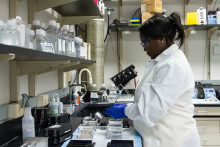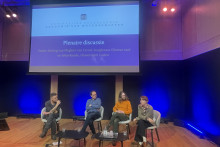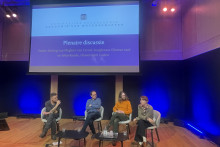For many researchers, the lockdown is making it impossible to complete their research on time, yet they often also cannot get an extension on their temporary contracts. Current law prevents that.
Forcing young researchers to cut short their work now is tantamount to capital destruction, argues KNAW president and Greek language and literature professor Ineke Sluiter. ‘Not only because the advances they’re working on won’t come to fruition, but also because it hobbles the careers of talented researchers. It’s important that we do something about this.’
Sluiter took up the presidency of the Royal Netherlands Academy of Arts and Sciences (KNAW) on 1 June. In her inaugural lecture, she warned that the coronavirus crisis threatens to create a ‘lost generation’ of researchers.
Scenarios
The PhD Network Netherlands (PNN) is also rallying to the cause of the ‘lost generation’ that Sluiter fears. The Network helped in drafting a guide for PhD candidates, postdocs and tenure trackers facing delays.
The document includes a questionnaire and sample scenarios to help researchers start a dialogue with their institutions, covering aspects such as: Was their research just getting started when the crisis broke out, or was it in its final stages? Were they able to continue collecting data in recent months? Did they have to care for children whilst working from home?
Price tag
‘These aren’t ironclad rules’, explains PNN chair Lucille Mattijssen. ‘Mostly we hope universities will draw inspiration from it and straighten out their compensation.’
Ongoing research projects at risk of being cut short are the biggest problem. ‘Our ideal would be to get contract extensions for every PhD candidate who’s been delayed,’ says Mattijssen, ‘but we know that comes with a price tag. We’re trying to devise as many alternative solutions as possible to ensure no research goes to waste’.
Even so, the sector won’t make it without extra funding, she emphasises. ‘It would certainly be good if the government could expand its budget for research projects in real need of more time.’
Count or weigh
Meanwhile, university association VSNU is also coming up with a variety of solutions for scientific research affected by the coronavirus crisis. It’s proposing for instance that tenure track assessors also consider aspects like time and energy invested in online teaching. And that PhD candidates can demonstrate their competency just as well in three strong chapters as in the usual four.
‘The point is how you judge if someone is capable of doing independent research’, says KNAW President Sluiter. ‘Do we only count, or should we weigh as well? In the university world we’ve been wanting to weigh for a long time. Now’s the time to turn that talk into action.’
Tailored solutions
Both trade unions and employers understand that resources are needed to cushion the blows. Under the new collective labour agreement, universities are thus reserving 0.45 per cent of the total scope for pay rises to renew temporary contracts for researchers, PhD candidates, lecturers and support staff. ‘This speaks to a real solidarity among universities’, Sluiter points out. ‘People fully grasp the situation we’re in.’
She also approves of the stance the Dutch Research Council has taken in this crisis. The funding body is easing rules and offering to postpone deadlines for research that has been delayed. ‘I think they’re making a great effort to tailor solutions as far as possible.’
Earlier this year, Sluiter and her advocacy group Athena’s Angels – of which the KNAW president remains a member – already warned of the impact the coronavirus crisis would have on women in research. Shifting grant deadlines will disadvantage women, they said.
Sluiter is therefore pleased the Dutch Research Council this month pledged to be flexible about scheduling interviews with female researchers who are pregnant. ‘These decisions have to be made at the top. The only people who can make this promise are the board. I think the Council has demonstrated true leadership here.’
Speculation
Perhaps, Sluiter suggests, the research funder could also tap some of its other funds to solve coronavirus bottlenecks. ‘What springs to mind is the sum allocated to expand the National Science Agenda this year. That added portion of the total could be tapped this year as a one-off. But the Council can’t do that unilaterally, so it would be good if the minister made this designation.’
As things stand now, funding resources are likely to be insufficient. ‘That’s more probable than not’, thinks Sluiter. ‘Though it’s a matter of speculation. Everyone’s willing to get on board and I think things are moving in the right direction. But we won’t be done with this crisis any time soon.’
Whether universities receive the money needed for academics who are forced to prolong their research remains uncertain. The minister has been holding consultations but made no promises yet. In any event, the Lower House wants her to find a solution for postdocs with no prospect of contract renewal.







